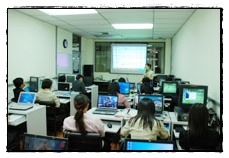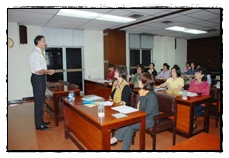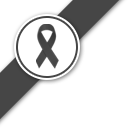Training
In addition to graduate education, INMU provides formal and non-formal training on relevant food and nutrition issues for professionals working in Thailand and other countries. These sessions take the form of short-course training programs as well as attachment programs. Often, these training programs are specifically requested by governments, non-governmental organizations, or international development agencies. They may vary in duration from, for example, one week to four months, depending upon the topic being studied and the time constraints involved in completing a training program to meet the requirements of funding organizations.
Local Training
Training Services in Food and Nutrition
This service involves workshops and training courses in a variety of areas, such as quality assurance systems for food and water, food microbiology, laboratory quality control systems, and nutrition labeling. The latter entails a one- to two-day training program on food, nutrition, and nutrition labeling; nutrition facts; nutrient and health claims; and a quality control program for food analysis laboratories. Training services target food producers, industrial personnel, consumers, and food analysis from private and governmental organizations.
International Training
Short-Course Training
The Institute’s international short-course training programs have evolved from our experience over the past few decades in organizing many needs-based training programs. Areas of training cover a range of food and nutritional issues such as the following:
A one-week policy seminar for high level policy-makers and planners is offered to multi-disciplinary teams involved in formulating food and nutrition policies, plans and programs in their respective countries.


A two- to six-week training course in community nutrition program planning, management, implementation and evaluation is also organized, combining theoretical considerations and discussions with Thai authorities from both policy-making and implementation units.
Direct field experience is obtained through short field trips to projects that are relevant to improving food and nutrition policy-making, planning and programming, as well as hands-on experience in data collection and the formulation of action plans.
A two-week training course on developing applied food and nutrition projects is available for participants from fellow countries of the South East Asia Nutrition Research-cum-Action Network. The course aims at assisting professionals in member countries to design protocols, implementation and evaluation plans, and to develop a project proposal on specific questions identified by participants.
Health and nutrition education/communication is an important area that helps to translate food and nutritional sciences into action. A three- to four-week course, which includes classroom lectures, discussions, and field trips, can be arranged upon request.
Specific nutritional assessment methodologies including field techniques (e.g., anthropometry, dietary assessment) and laboratory-based techniques (e.g., biochemical parameters of various nutritional deficiencies) are dealt with in this short-course training program. Examples include surveys of nutritional deficiencies within communities, as well as biochemical techniques of iron and vitamin A assessment.
Short-course training programs are also offered upon request in the areas of Applied Food Science, Food Safety and Toxicology, and Applied Biostatistics.
International Attachment Program
The Institute’s international Attachment Program is conducted as an integral part of the on-going graduate program in Applied Food and Nutrition for Development. It is designed to meet the needs of professionals who want specialized training in specific areas and who are not able to complete a full graduate degree program due to funding or time schedule limitations.
Over the course of approximately four months (an academic semester), fellows attending the Attachment Program are recommended classes and individual project work aimed at meeting their specific needs. A Certificate is offered to fellows for attendance or achievement upon completion of the assigned work for the semester. A Diploma is also offered for those who attend two consecutive semesters and complete larger assigned projects. The Attachment Program is organized so that it coincides with the regular semester schedule (June-September; November-February) and fellows are able to learn alongside peers working towards their MSc degrees.
INMU Training
- Training on Proficiency Testing for Measurement of Water Activity in Food PT-AW 2559
- Training on production of calcium-enriched soybean milk
- Training on quality development of bottled drinking water
Contact:
Training Section, Institute of Nutrition Mahidol University
Phutthamonthon 4 Rd., Salaya, Phutthamonthon,
Nakhon Pathom 73170, Thailand
Tel. +66 2 800 2380 ext. 406
Fax. +66 2 441 9344

